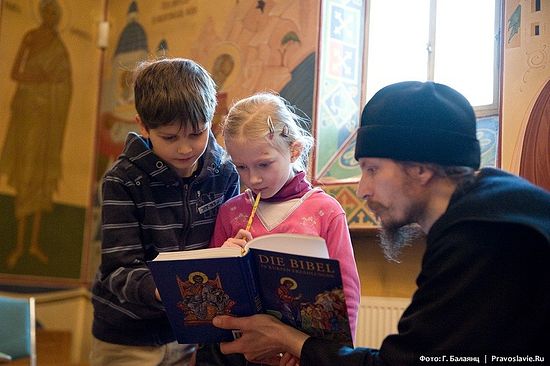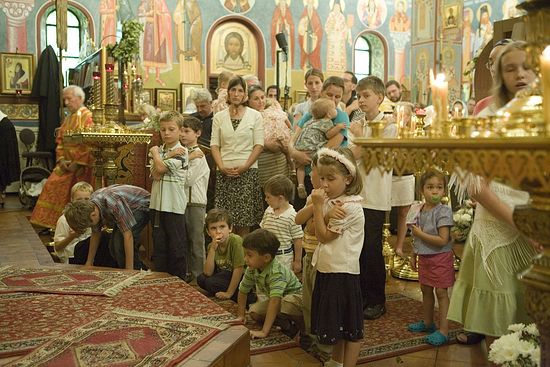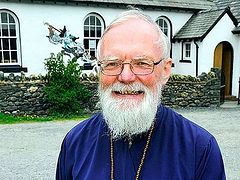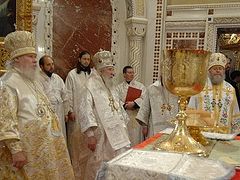Introduction
For well over fifty years now, and in virtually every country in Western Europe, that is in countries with a millennium of Catholic-Protestant culture, small numbers of Western Europeans have been joining one or other of the local dioceses of the Orthodox Church. In general it can be said that the numbers joining have been higher in the less traditional and more Protestant countries and lower in traditional Catholic countries like Italy, Spain and Portugal. And numbers have been much higher among more uprooted and cosmopolitan city-dwellers than among more traditional country-dwellers. Here there is something to do with spiritual degeneration. Though there is a detailed thesis here, the full story of this Europe-wide movement has yet to be written – probably because it has so far been very marginal.
In some countries, especially small ones like Ireland, Denmark, Norway, Austria and Luxembourg, where also there has been relatively little immigration from ‘Orthodox countries’ until recent years, numbers of native Orthodox are tiny, often a few dozen at most. In other countries, especially larger ones like Germany, France and Great Britain, which have also received more immigrants from ‘Orthodox countries’ in Eastern Europe, numbers of native Orthodox rise into the low thousands. Indeed, the process has been under way for so long that in all these countries we can find adults who are second and third generation Orthodox of purely Western European origin.
Some of the first generation are now elderly and have been members of the Orthodox Church for between forty years and seventy years. Some have been present for between twenty and forty years. Others are newcomers who have entered into communion with the Church more recently, only over the last twenty years. On the surface, it might seem that there are today anything between 10,000 and 20,000 native Orthodox living in Western Europe. (Here we exclude those who have already passed on). However, such a high figure is very misleading because in order to understand real numbers we have to look at the motivations of those who have joined the Orthodox Church in Western Europe, sociological and not spiritual motivations which sadly have resulted in a majority of those received and their descendants lapsing from the Faith.
Marriage
Firstly, there are those who have had to join the Orthodox Church because they have married an Orthodox. It is true that some of these individuals have come to appreciate the Church and play a part in parish life. In other words, they have not only joined the Orthodox Church, they have actually become Orthodox and spontaneously and naturally have Orthodox values, think in an Orthodox way and live an Orthodox life. However, for the majority that is not the case. Their membership of the Church is purely nominal, often because the membership of the Church of the Orthodox whom they have married is also nominal.
Without an example of Church life, spouses will not take up Church life. Moreover, if their spouses belong to parishes where the whole service is in an inaccessible foreign language (often also largely inaccessible to the second-generation Orthodox spouse), clearly the possibility of their interest is greatly lessened. We doubt if there are more than a few hundred Western Europeans who, though they have joined the Orthodox Church because they have married Orthodox, have actually become Orthodox. The rest, the vast majority, have to all intents and purposes lapsed (though arguably it could be said they never lapsed because they were never part of the Church anyway).
Converts
Secondly, there are those who previously practised Catholicism or Protestantism (including its Anglican variant). They have often been disillusioned by the denomination in which they have grown up and left it for Orthodoxy. These people really are converts. Here we have to look very closely at motivation. Some have left their original denomination disgruntled and angry and then joined the Orthodox Church for negative, purely psychological, occasionally psychopathic, reasons. These people never become Orthodox, for they spend their time looking backwards, either nostalgically and investing themselves heavily in ecumenism and the past, or else in anger, raging against ecumenism and their original denomination. Neither group ever looks forward to the Church and living in Her, but lives off the baggage of the past which they attempt to impose on the Church by trying to ‘reform’ Her! I have met so many like this, who, even after twenty, forty and sixty years, have still never become Orthodox. These are the eternal converts who love being converts and, in one way or another, always lapse from the mainstream, or rather have never been part of the mainstream, blinded by psychological deformations. Needless to say, they do not hand on Orthodoxy to their descendants because they have no Orthodoxy to hand on.
On the other hand, there are those who, with an open mind and without psychological hang-ups or ‘baggage’, have naturally evolved through repentance from some sort of Protestantism or Catholicism (it is much the same thing) and become Orthodox, ever deepening their Faith. They realize that Orthodoxy is simply Christianity and that, before, they were simply not Christians in the fullness of the word, they both had too much of something (phariseeism, moralism, guilt etc) or lacked something (sacramental life, spiritual understanding, simplicity etc). They understand that previously they had been conditioned by deformations of Christianity and that now, at last, they understand what the Church is. Although this group are a minority amongst converts, they are the positive ones because they not only join the Church, but with time actually become Orthodox, ridding themselves of the deformed cultural reflexes of their past. There may be 2-3,000 such Orthodox Western Europeans.
Fantasy
Thirdly, there have been those who have been brought into the Church under false pretences by fantasist proselytists, false ‘elders’, people who love giving themselves titles (‘spiritual fathers’) and exude the desire to be admired. For example we well remember one bishop who, desperate to fill his tiny parish, which most serious Orthodox did not attend once they had discovered what it was about, probably brought in 2,000 people over his lifetime; they mainly lapsed very swiftly. His technique was to attract people, mainly wealthy people from the upper-class Establishment, through his undoubted personal charm and, under the influence of almost semi-hypnosis, he would receive them within a few days or weeks at most. Few lasted more than six months; some only lasted days. I have come across many of his victims (I use the word with reason). Some have never been back to Church since the day he received them; many have returned to various cliques of Anglicanism, where he found them, or invented their own. Since he died, all his fantasies have come to grief and a new generation is growing up, never having heard of him.
Another priest, an ex-Anglican vicar, has been desperate to ‘recruit’ to his tiny community. His technique, sadly common among many of his background who seem not to have any time for the vast majority of Non-Anglican English people, is to receive anyone who shows the slightest interest in the Church. The result is an incredibly high turnover. His tiny flock changes almost completely every six months. A high lapse rate is certain. Outside England old calendarists and others of a sectarian mentality in France (both perennialist Kovalevskians and old calendarists), Italy and Portugal, without any base of faithful, have recruited heavily among traditional Catholics. In Portugal these old calendarists used to include Catholic saints in their calendar! Again turnover, that is, the lapse rate, has been very high. Why remain in a group that is a sect and is not in communion with the Orthodox Church? There have been many pastoral disasters in such groups. Stability is definitely not a word that belongs to the vocabulary of such sectarians, for, once more, they too have built on sand. Nevertheless, there are some issued from false missionaries who have seen through the charlatans and moved on to stable Church life elsewhere.
Descendants
Fourthly, there are those who have so far lost any identity inherited from their parents that, although they are technically not Western Europeans, they are so Westernized that they might as well be. These are the descendants of immigrants from ‘Orthodox countries’., children, grandchildren, great-grandchildren right up to the sixth generation and more. Sadly, it has to be said that, once children lose the Orthodox culture of their parents (often fairly minimal anyway), the assimilation rate is very high. Conditioned by the acid bath of Western schools with their intense secularist propaganda, not to mention television and social media, Orthodox cultural reflexes tend to be quickly worn down, especially as the generations pass. We know of such Orthodox who still occasionally go to church, but they will not attend if it is not on the new or Western calendar and if they cannot sit down at services and they will not take communion if they have to have confess first. Clearly, nothing can be built on such semi-Orthodox.
On the other hand, there are Orthodox of later generations, perhaps especially of the third generation, who have lost the conformist and integrationist inferiority complex and reflexes of the second (‘Schmemannite’) generation and want to return to and understand their roots as well as the first millennium roots of the countries where they live. Obviously their knowledge of their ancestors’ language may be negligible, but this is not a problem in itself. If they have zeal for the Faith and want to go to the roots of the Faith, then such Orthodox, of any generation, including those issued from mixed marriages, can bring a great deal to Church life. There are several thousand such Orthodox in Western Europe and they, together with the first generation of immigrants, are the backbone of the Church, even though they are not, even in part, native Western Europeans.
Conclusion
There are Orthodox in the above categories, admittedly in some more than others, who play a role in Church life in Western Europe, and not just an academic or titular one, but a real one. Whether people have come to the Church of God by marriage and avoided the temptation of nominalism, whether they are converts from one of the heterodox denominations and avoided the temptation of living with the baggage of the past and overcome psychology in favour of theology, whether they have been brought into the Church by false missionaries but seen through them to the real Church, whether they are of ‘Orthodox’ origin, but have resisted the temptations of assimilation and minimalism, there are in all these groups several thousand genuine Western European Orthodox. To them we can add others, also repentant.
For we have not yet mentioned those who simply come to the Church because the Church is their spiritual home. We are not converts, we do not have any baggage with us, we simply want to join the Church in order to be what in our souls we always have been: Orthodox. We enter the Church and are at once at home in Her and cannot live and have never been able to live without Her. We cannot be anything other than Orthodox. We have no desire to ‘reform’ the Church, but are happy with Her as She is. We are the people who simply want spiritual food and have no cultural hang-ups and no heterodox culture with which to create some sort of Halfodoxy, half-Protestant/half-Orthodox’, ‘Anglo-Catholicism with icons’, the Tridentine Mass with icons etc. I can remember how shocked I was over 40 years ago when I was asked by a Greek priest: ‘Who brought you to the Church?’, obviously expecting the name of a bishop or priest in answer. When I answered truthfully: ‘God’, he seemed shocked. I thought how utterly deformed his expectation had been. He could only see an Orthodoxy dependent on some personality cult.
The fact is, whatever our path to the Church anywhere, Church life can only be built on the Rock of Tradition, not on the sand of the compromises of negative traits, of nominalism, pathology, fantasy or minimalism. Though you may be very zealous, you cannot be missionaries if you have nothing of spiritual value to give, your zeal is purely psychological, not of the heart, not repentant. The Church lives by the Holy Spirit, not by fallen human psychology and ideology. Sadly, we have seen many cases where individuals have tried to build the Church in Western Europe on the sand of compromise, without repentance, without leaving false cultural values behind them. All such attempts, and we have seen a great many of them, have ended in failure, they are fantasy swept away by reality, as a result there are well over ten thousand native Western Europeans who have lapsed from a corrupted form of Orthodoxy. Such have been and will continue to be washed away, like so much sand when the tide comes in. That is failure. On the other hand, there are those who are building the real and future Church in Western Europe on the Rock of the fullness of the Orthodox Tradition that no tide can ever wash away. That is success.





